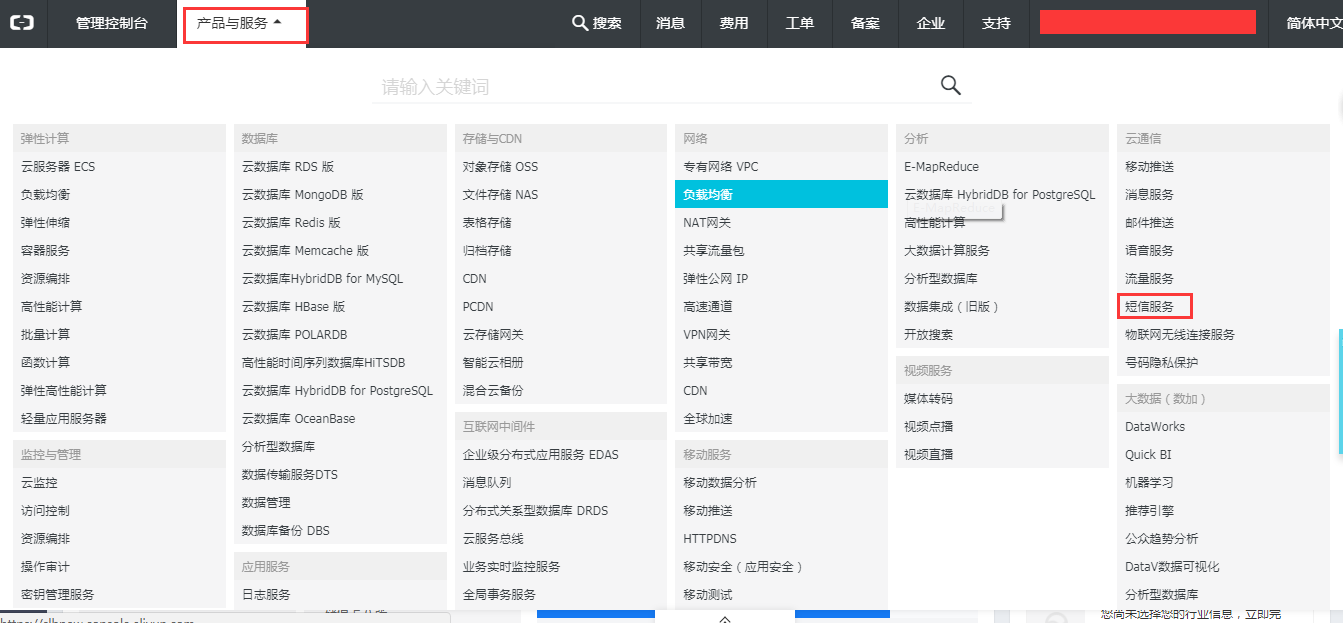一,alibaba短信接口调用
1)调用阿里的短信接口是很方便的,前提是你要开通好阿里的短信服务;
二,开通大体流程
1)登录阿里控制台----->开通短信服务------>交钱-------->获取AK-------->配置签名(配置消息签名,一般是公司名)
-------->配置模板(配置消息内容,例如:你的验证码是${code},请妥善保管.....)------->开发

三,下载demo,引入依赖jar包
<dependency>
<groupId>aliyun.java.sdk</groupId>
<artifactId>core</artifactId>
<version>3.3.1</version>
<systemPath>${project.basedir}/src/main/webapp/WEB-INF/lib/aliyun-java-sdk-core-3.3.1.jar</systemPath>
<scope>compile</scope>
</dependency>
<dependency>
<groupId>aliyun.java.sdk</groupId>
<artifactId>dysmsapi</artifactId>
<version>1.0.0</version>
<systemPath>${project.basedir}/src/main/webapp/WEB-INF/lib/aliyun-java-sdk-dysmsapi-1.0.0.jar</systemPath>
<scope>compile</scope>
</dependency>
四,调用接口
@Controller
public class ShortMessageController {
//产品名称:云通信短信API产品,开发者无需替换
static final String product = "Dysmsapi";
//产品域名,开发者无需替换
static final String domain = "dysmsapi.aliyuncs.com";
// TODO 此处需要替换成开发者自己的AK(在阿里云访问控制台寻找)
static final String accessKeyId = "**********";
static final String accessKeySecret = "**************";
@Autowired
private VerificationCodeMapper verificationCodeMapper;
@RequestMapping("getSsm")
@ResponseBody
public String getSsm(String number) {
//可自助调整超时时间
System.setProperty("sun.net.client.defaultConnectTimeout", "10000");
System.setProperty("sun.net.client.defaultReadTimeout", "10000");
//初始化acsClient,暂不支持region化
IClientProfile profile = DefaultProfile.getProfile("cn-hangzhou", accessKeyId, accessKeySecret);
try {
DefaultProfile.addEndpoint("cn-hangzhou", "cn-hangzhou", product, domain);
} catch (ClientException e1) {
e1.printStackTrace();
}
IAcsClient acsClient = new DefaultAcsClient(profile);
//随机生成六位验证码
int code = (int)((Math.random()*9+1)*100000);
//删除该号码上次的验证码记录
verificationCodeMapper.deleteVerificationCodeMapper(number);
//保存到数据库
VerificationCode verificationCode = new VerificationCode();
verificationCode.setCode(code+"");
verificationCode.setNumber(number);
int i =verificationCodeMapper.addVerificationCode(verificationCode);
//组装请求对象-具体描述见控制台-文档部分内容
SendSmsRequest request = new SendSmsRequest();
//必填:待发送手机号
request.setPhoneNumbers(number);
//必填:短信签名-可在短信控制台中找到,你在签名管理里的内容
request.setSignName("星晨");
//必填:短信模板-可在短信控制台中找到,你模板管理里的模板编号
request.setTemplateCode("SMS_115760262");
//可选:模板中的变量替换JSON串,如模板内容为"亲爱的${name},您的验证码为${code}"时,此处的值为
request.setTemplateParam("{"code":""+code+""}");
//选填-上行短信扩展码(无特殊需求用户请忽略此字段)
//request.setSmsUpExtendCode("90997");
//可选:outId为提供给业务方扩展字段,最终在短信回执消息中将此值带回给调用者
//request.setOutId("yourOutId");
//hint 此处可能会抛出异常,注意catch
SendSmsResponse sendSmsResponse = null;
try {
sendSmsResponse = acsClient.getAcsResponse(request);
} catch (ServerException e) {
e.printStackTrace();
} catch (ClientException e) {
e.printStackTrace();
}
//获取发送状态
String cod = sendSmsResponse.getCode();
return cod;
}
}
